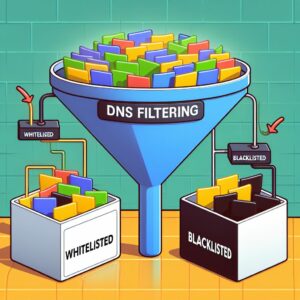The Power of DNS Filtering
Safeguarding Your Network with Managed Services
In today’s ever-evolving cybersecurity landscape, businesses are continually seeking robust solutions to protect themselves against a growing range of online threats. Among the many security measures available, DNS filtering stands out as a critical tool for defending networks against various types of cyberattacks. As a Managed Services Provider (MSP), we recognize the importance of DNS filtering and are dedicated to helping businesses implement this essential layer of protection.
Understanding DNS Filtering
Before diving into its significance, let’s first explore the basics of DNS filtering. The Domain Name System (DNS) is the backbone of the internet. It translating human-readable domain names into IP addresses, enabling communication between devices. DNS filtering works by intercepting DNS requests to determine whether access to a specific website should be allowed or blocked, based on predefined security criteria.
Primary Types of DNS Filtering
- Blacklisting
This approach involves maintaining a list of known malicious domains and preventing users from accessing them. It acts as a barrier to harmful websites, phishing attempts, malware distribution, and other cyber threats. - Whitelisting
The opposite of blacklisting, whitelisting allows access only to a pre-approved list of trusted websites, while blocking all others. This ensures that users can only visit secure sites, reducing the risk of exposure to malicious content.
Popular DNS Filtering Methods
- Policy-Based DNS Filtering
Policy-based filtering enables businesses to customize which sites are accessible to users and which should be blocked. By setting guidelines based on the nature of the business, employers can regulate internet usage. For example, industrial chemical companies may block social media sites to improve productivity. While companies in the tech industry may allow access to competitor social media sites to track features and trends.
Additionally, policy-based filtering offers granular control, allowing for user- or group-specific settings. While this approach is effective, it requires regular maintenance and updates to ensure its continued accuracy. - Sinkhole DNS Filtering
Sinkhole DNS filtering redirects users to a “blackhole” IP address when they attempt to access a malicious site. This effectively prevents them from reaching harmful content, displaying a blank page instead of exposing them to malware or other threats. - Machine Learning-Enhanced DNS Filtering
With the vast number of websites on the internet, manual whitelisting becomes increasingly challenging. Sites that are secure today may change over time, making them vulnerable to attacks. Whereas, by incorporating machine learning into DNS filtering, these systems can dynamically update whitelists by analyzing websites for malicious behavior. This helps ensure that once-safe sites are not mistakenly blocked while enhancing protection against new and evolving threats.
The Importance of DNS Filtering
- Enhanced Security Posture
DNS filtering serves as an invaluable line of defense against a broad range of cyber threats, including malware, ransomware, phishing, and botnets. By proactively blocking access to known malicious domains, businesses can significantly reduce their risk of cyberattacks, safeguarding sensitive data and ensuring operational continuity. - Regulatory Compliance
With regulations like GDPR, HIPAA, and CCPA demanding strict data protection measures, DNS filtering can help businesses maintain compliance. By reducing the risk of data breaches and ensuring employees adhere to acceptable internet usage policies, DNS filtering supports organizations in meeting regulatory requirements. - Productivity Enhancement
In addition to security benefits, DNS filtering can also boost workplace productivity. By blocking access to non-work-related websites, businesses can reduce distractions and keep employees focused on their tasks. Granular controls over internet access enable companies to create a more efficient and productive work environment. - Cost-Effective Solution
Compared to traditional security tools like firewalls and antivirus software, DNS filtering is a cost-effective solution that requires minimal infrastructure. As a cloud-based service, it integrates easily into existing networks without the need for additional hardware or significant investments. Thus, making it an ideal option for businesses of all sizes.
Why Choose Orange County Computer for your DNS services
As a trusted MSP, Orange County Computer specializes in providing comprehensive cybersecurity solutions that are tailored to the unique needs of our clients. By partnering with us for DNS filtering, you can benefit from:
- Expertise: Our team of seasoned cybersecurity professionals has the knowledge and experience to design and implement robust DNS filtering strategies aligned with your business goals.
- 24/7 Monitoring and Support: We offer round-the-clock monitoring and support to ensure continuous protection and timely resolution of any emerging threats.
- Scalability: Whether you’re a small business or a large enterprise, our scalable DNS filtering solutions can grow with your needs.
- Cost Savings: Outsourcing DNS filtering to us reduces the overhead associated with maintaining in-house security infrastructure, helping you allocate resources more efficiently.
Final Thoughts
In conclusion, DNS filtering is a vital component of modern cybersecurity strategies, offering unparalleled protection against a wide range of online threats. As your trusted Managed Services Provider, we are committed to helping you fortify your defenses and mitigate cybersecurity risks. Contact us today to learn more about how DNS filtering can protect your business and help you build a more secure, resilient network infrastructure.

